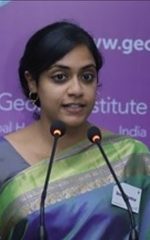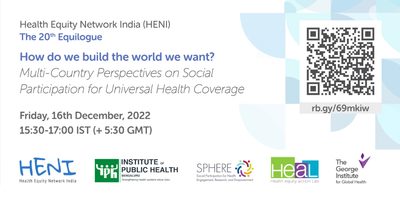
Resourcing Social Participation for Health: It’s on (us and) the Government
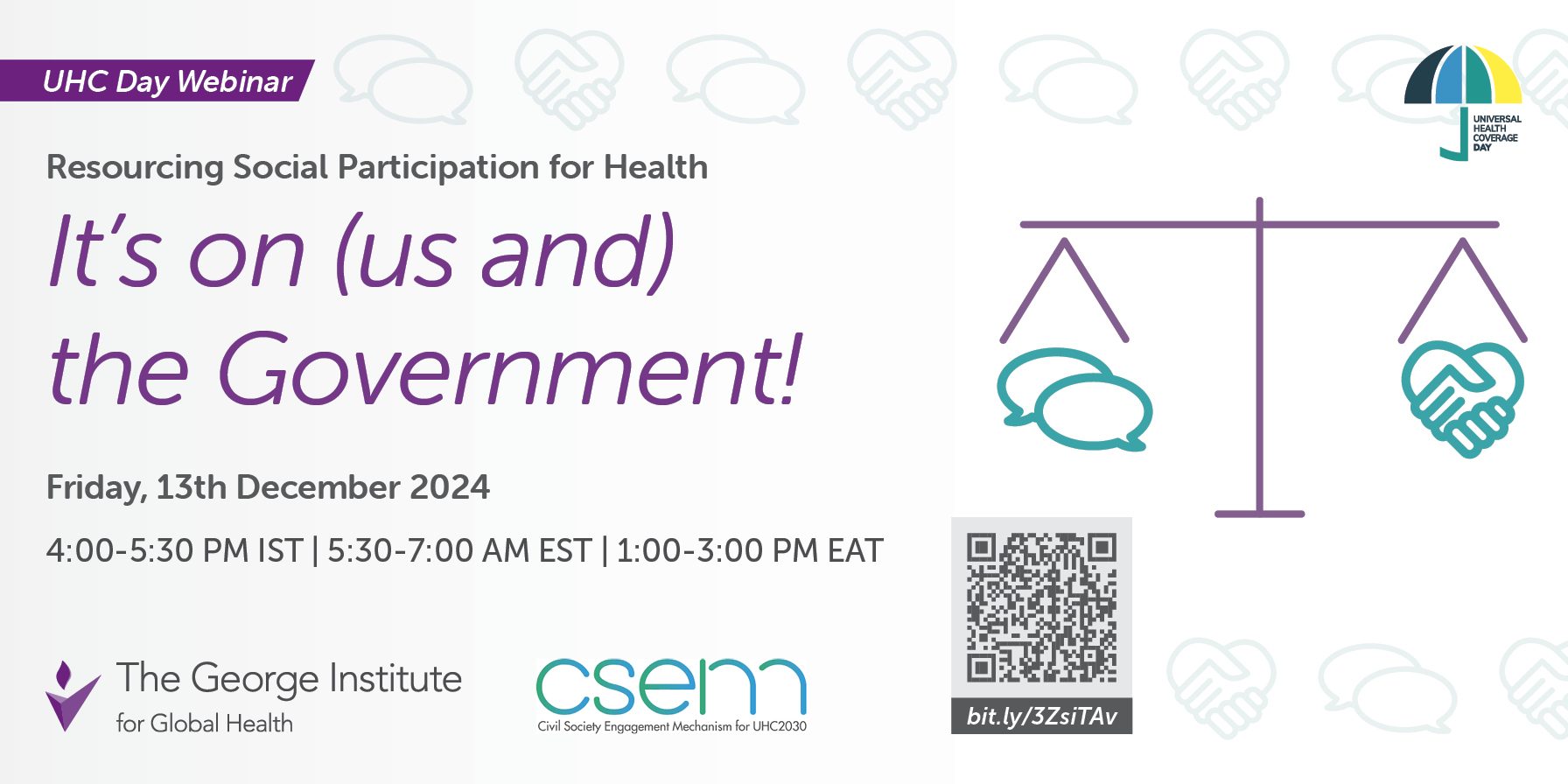
Social Participation for Health (SPH), also known as Community Action for Health (CAH), involves people, communities and civil society organizations in decision-making processes across different levels of the health system and policy cycle. Rooted in the 1978 Alma Ata Declaration, SPH is aimed at empowering marginalized populations to articulate their health needs and advocate for their rights. As the world considers progressing with the Sustainable Development Goals and beyond, SPH is seen as particularly critical to ensure governance is inclusive, reforms are both responsive and sustainable, and that we move towards a more just and inclusive global society.
The 77th World Health Assembly (WHA) held in Geneva this year acknowledged the role of social participation in helping ground health systems on fundamentals of mutual respect and trust to make them more responsive, equitable and resilient. An important milestone, “Social participation for universal health coverage, health and well-being”, a resolution targeted at tackling health inequities and the erosion of trust in health systems co-proposed by Slovenia and Thailand, was approved for adoption by the Member States at the Assembly. Following from this, the Government of Thailand has sought to advance and coalesce civil society and state actor commitments to this resolution through their National Health Assembly (NHA) platform in November 2024. The agenda of this meeting will include a 2-year workplan on collaborative work for social participation, and “Open Space for Social Participation”, which will be another opportunity for participants to meet and exchange ideas and experiences on participatory governance, social issues and health.
Building on the upcoming NHA in Thailand, as well as the theme of UHC Day 2024, the George Institute for Global Health, India, is organising a webinar. In this webinar, Ms. M.K. Rafeekha Mannengal, Distrcit Panchayat President, Malappuram District, Kerala, and Mr. Suresh Dhandapani, SOCHARA, Tamil Nadu, will share their experiences from the “Open Space,” and on mobilising resources to advance social participation for health. We will also hear the perspective of colleagues from HENNET, Kenya, members of the SPHERE consortium on social participation for health. They have been focused in particular on financing for UHC and thinking about what reforms have been put in place and how they correspond to the needs and demands of communities.
Speakers
Ms M.K. Rafeekha Mannengal, District Panchayat President, Malappuram District, Kerala
M.K. Rafeekha President, Malappuram District Panchayat, a prominent figure in local politics. M.K. Rafeeka currently serves as the President of Malappuram District Panchayat, representing the Anakayam division, Malappuram, Kerala. Rafeekha has been instrumental in playing a crucial role in bridging the gap between rural and urban areas through innovative policies. Focused on improving education, healthcare and infrastructure in rural areas. Her previous experience as the President of Pulamanthol Grama Panchayat from 2010-2015 and success fully implemented local development projects. Recognized for her ability to address community issues effectively and inclusively. During her tenure as the President of Pulamanthole Grama Panchayat, Rafeekha has successfully secured eight awards, including the prestigious Swaraj Trophy. Her efforts have significantly contributed to improving local governance and enhancing the quality of life for residents in the area.
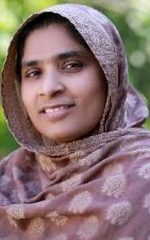
Ruth Warutumo, Partnerships and Resource Mobilisation Coordinator, Health NGOs' Network (HENNET) in Kenya
Ruth Warutumo is the Partnerships and Resource Mobilisation Coordinator at Health NGOs' Network (HENNET) in Kenya. She assists in the daily operations of the network to ensure good governance and with sourcing strategic collaborations for effective advocacy in health policy with the aim of achieving improved and sustained health outcomes of communities. She is a Public Health Specialist with experience in Health Financing and holds a Master's Degree in Public Health from the University of Nairobi, Kenya.
For the past two decades, Ruth has been involved in Community Action implementing and managing projects focusing on Human Rights, Disabilities, Child Protection, Health Systems Strengthening, Social Welfare, Education, Entrepreneurship, Gender Based Violence and Emergency Response. This has been done while working at the Nairobi Baptist Church, Ngong Road, Merlin International, Consortium of British Humanitarian Agencies, Save the Children and Gird Child Network.
Ruth is currently implementing a project on Social Participation for Health (SPH) funded by Social Participation for Health: Engagement Research and Empowerment (SPHERE) Consortium (www.spheretogether.org) through Management Sciences for Health (MSH). The project seeks to conduct a study on the involvement of communities and civil society in Universal Health Coverage in Kenya (UHC). The project will shed light on the Public Participation model of SPH being used in Kenya.

Suresh Dhandapani, Communications Officer, SOCHARA, Tamil Nadu
Suresh Dhandapani is a community health professional with a background in IT and communication, holding a degree from Madras University. Since 2010, he has worked as communication managers at SOCHARA in Chennai. With a passion for health rights, equity, and research, Suresh has been involved in various social movements and voluntary organizations since school. Suresh’s work in public health began with the NRHM's Communitization Pilot Process in Tamil Nadu, now known as Community Action for Health (CAH). Currently, he ;eads the Right to Health campaign in Tamil Nadu, organizing health assemblies, advocating for universal health coverage, and conducting post-COVID public health research. Their efforts focus on maternal health, adolescent health, and child malnutrition, aiming to improve public health outcomes.
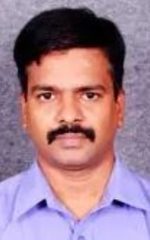
Dr. Margaret Lubaale, Executive Director for Health NGOs Network (HENNET), Kenya
Dr. Margaret Lubaale is the Executive Director for Health NGOs Network (HENNET). The Network carries an unbiased mandate which enables it to coordinate capacity building, strategic partnerships, collaborations, networking, representation in policy and decision-making processes, articulating and sharing policies, and facilitate information sharing among Civil Society Organizations. Over the course of 20 years, she has provided strategic leadership and direction to various teams to ensure successful program implementation in areas ranging from health and HIV, education, water, sanitation and hygiene, prevention of sexual and gender-based violence, and child protection. Dr. Lubaale has a deep understanding of Kenya’s health sector. She is currently leading advocacy projects in PHC, MNCH and Immunization.
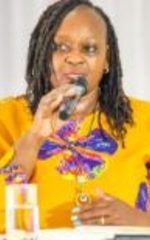
Waiswa Nkwanga, Coordinator, CSEM Secretariat
Waiswa Nkwanga is Senior Technical Advisor and Coordinator of the Civil Society Engagement Mechanism (CSEM) for UHC2030 at Management Sciences for Health (MSH). He leads the CSEM Secretariat and the 18 Advisory Group members in implementing global, regional, and national level advocacy strategies to achieve UHC and health for all.
Prior to joining MSH, Waiswa was Senior Associate at the ACTION Global Health Partnership at Results, where he oversaw the partnership’s work on tuberculosis, the Global Fund, and research and development for health technologies and innovations. He also led the partnership’s engagement with the G20.
Born and raised in East Africa, Waiswa attributes his passion for international development, human rights, and global health to his experience growing up at the height of the AIDS epidemic, armed conflicts, and structural adjustment policies all of which stifled economic development and further weakened health systems in the region. He holds a MSc. in International Development and Humanitarian Emergencies from the London School of Economics and a BA in Political Science from the University of California, Berkeley.
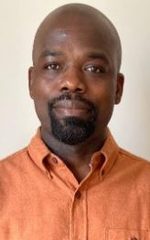
Devaki Nambiar, Program Director, The George Institute for Global Health, India
Devaki Nambiar is Program Director at the George Institute for Global Health India with appointments at the Manipal Academy of Higher Education, India, the University of New South Wales, Australia and the Harvard TH Chan School of Public Health, USA. For two decades, she has led mixed methods research, technical assistance, training and capacity-strengthening related to health policy and systems, with an emphasis on health equity and the social determinants of health. She has a passion for and commitment to social participation for health and is part of the Secretariat of the Social Participation for Health: Engagement Research and Empowerment (SPHERE) Consortium (www.spheretogether.org). She completed her doctorate from the Johns Hopkins Bloomberg School of Public Health in 2009.
